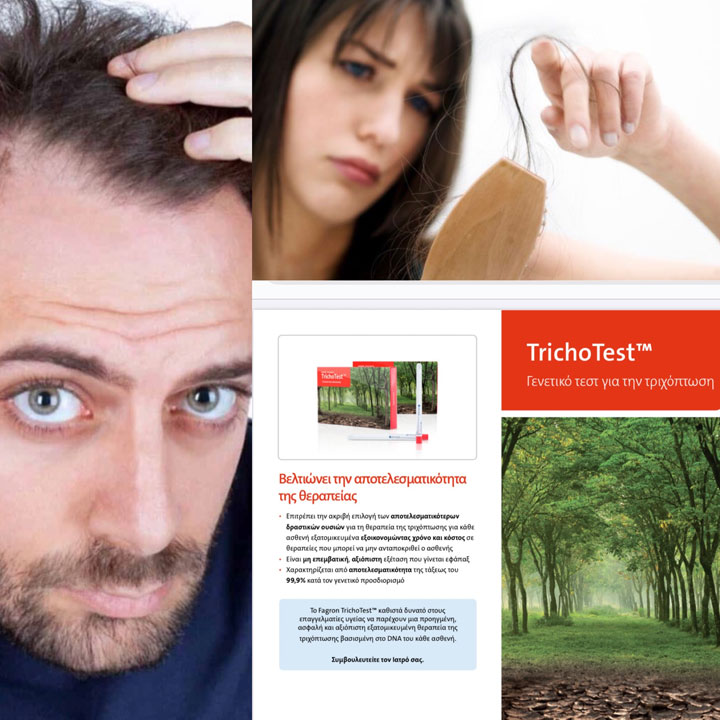The common causes of hair loss are, apart from stress, seasonality, thyroid dysfunction, iron deficiency, childbirth and stop taking birth control pills (contraceptives), the intake of some drugs (retinoids, barbiturates, chemotherapy drugs, etc.) as well as exhausting dehydrating diets and finally heredity.
In most cases, diffuse alopecia areata (hair loss) can be restored with special nutritional supplements containing cysteine, zinc and Vitamin B Complex. There are also topical hair products (shampoo, ampoules, lotion) offering adjuvant treatment. Hair dyes, hairdressing and styling hair products do not affect hair loss. Excessive hair styling, bleaching etc. can damage the quality of the hair.
The androgenetic alopecia is the inherited predisposition for thinning hair that affects a greater percentage of men. It is due to genetic causes that make the androgen receptors in the hair follicles sensitive to normal androgens. The result is that the hair gradually becomes weaker, then thins and finally falls out. There are different types of thinning. So, some people lose hair by receding the frontotemporal line, others from the center of the head and others from the temporal regions. However, hair growth is always preserved in the occipital region (back of the head) and hair grafts are taken from there in cases where hair transplantation is performed.
The treatment of androgenetic alopecia consists of the application of topical preparations containing minoxidil. This is a substance that was originally used as an antihypertensive. It was then prepared for topical use and has very good results in androgenetic alopecia with continuous use. It works by increasing the vascularity and consequently the nourishment of the hair follicle. The dosage regimen includes 6 sprays 2 times a day for a long time.
Another suggestion for the treatment of androgenetic alopecia is the oral administration of finasteride (a 5-α reductase inhibitor). In the usual dosage for the androgenetic alopecia, it does not present serious side effects. This drug should only be administered by a dermatologist in young males under the age of 40.
The androgenetic alopecia in women is different from that of men, because no matter how much thinning there is, hair growth on the frontotemporal hairline never recedes. Minoxidil can also help significantly in this case, too. While, in postmenopausal women can also be given a topical preparation containing estradiol.
There are also alopecias such as alopecia areata where hair is lost from specific areas of the scalp, leaving oval or round shape bold patches. There is automatic regrowth in over 80% of the cases. The treatment includes cortisone lotions or cortisone injections on the lesions in order to stop the spreading of alopecia. The first hairs that will regrow are fine and blonde or white and then they are recolored. In new promising treatments rare and severe cases, the treatment with oral cortisone or even immunosuppressive treatment (e.g. cyclosporine) is needed. New treatments with biological agents and JAK inhibitors show promising results.
Finally, some dermatological diseases result in permanent alopecia, i.e. hair does not regrow in the affected areas (e.g. Discoid Lupus Erythematosus, Follicular Lichen Planus). So, the early diagnosis and treatment are of great importance to prevent the progression of the condition.
Τριχόπτωση: διερεύνηση με tricho test
